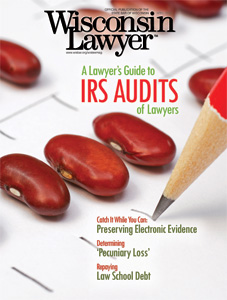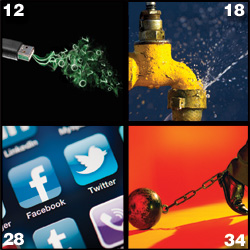April Wisconsin Lawyer features law firm tax audits,
preserving electronic evidence, and repaying student loans, among other
topics

April 9, 2012 – Who wouldn’t want to know the
opposition’s playbook? In the April Wisconsin Lawyer, now
available online
and in mailboxes soon, tax litigation lawyer Douglas Frazer reveals the IRS playbook to help law
firms and lawyers deal with tax audits.
Frazer of Dewitt, Ross &
Stevens S.C., Milwaukee, isn’t pulling a Bill Belichick here. (Belichick is the New
England Patriots coach who used video to spy on an opponent’s play
calling).
In March 2011, the IRS released a new Attorneys Audit Technique Guide
in connection with the examination of lawyers and law firms
specifically. With the guide as a backdrop, Frazer explains how
lawyers and law firms can best prepare when the IRS comes knocking.
“This article will help you prepare for the audit by looking at
it from the government’s point of view,” Frazer writes in his article, “A
Lawyer’s Guide to IRS Audits of Lawyers.”
Frazer explains what examiners are looking for
and how to prepare. “The law firm’s goals should: limit the
scope of the examination, keep a record of what the agent sees, and move
the agent through the process as quickly as possible,” he
writes.
Preserving electronic evidence
In his article, “Catch
it While You Can: Finding and Preserving Electronic Evidence,”
certified computer forensics examiner and attorney Bruce Olson explains
various scenarios that might require attorneys to preserve electronic
evidence, and the best way to proceed.
From trade secret claims and workplace harassment to divorce and
identity theft, Olson explains that attorneys “must have a basic
understanding of the kinds of evidence that can be recovered through use
of computer forensics from the digital devices we use in our daily lives.”
While discussing the basics, Olson stresses the importance of moving
quickly: “From the moment of case intake, a lawyer must be aware
of the role that electronic evidence may play in his or her case,”
writes Olson, president of ONLAW Technologies LLC,
Appleton.
Pecuniary loss under consumer protection regulations
As former judge Willis Zick notes in his
article, “Determining
‘Pecuniary Loss,’” the Wisconsin Department of
Agriculture, Trade and Consumer Protection regulations allow persons to
recover double damages for “pecuniary losses.”
So, as Zick explains, “determining what is a
pecuniary loss is critical.”
Now a mediator and arbitrator, Zick runs down the
relevant case law determining pecuniary losses in common consumer
protection cases, including motor vehicle repair and residential rental
cases.
Zick also predicts that future plaintiffs may have an easier time
overcoming the “difficulty of proving the actual damages required
to establish pecuniary loss.”

Student loan debt and other columns
If you’re a lawyer with student loan debt – or a law
student who will graduate with student loans – don’t miss
attorney Karen Bauer’s article, “Repaying
Law School Debt.”
“High educational debt is one of the most difficult challenges
facing new lawyers,” Bauer writes in the Practice Tips column.
“In this tight job market, many new lawyers may find themselves
unable to make their loan payments according to the standard repayment
schedule."
Bauer, an attorney with the Legal Aid Society of Milwaukee,
discusses the different repayment options available under federal loan
programs that can help lawyers lower their payments and avoid default.
Bauer also explains how to get out of default if it occurs.
She also highlights important updates under the Public Service Loan
Forgiveness Program for attorneys in public service, including release
of an “employment certification form.”
Find out how to “Mitigate
the Legal Risks of Using Social Media” in the Marketing column
by Sharon Nelson and John Simek, president and vice president of Sensei
Enterprises in Virginia.
In it, the authors explain the how to identify and minimize the risks
associated with the “incredible marketing, recruiting, and
customer relations benefits” of social media and provide sources
of information that lawyers can use to properly advise their
clients.
Finally, in the monthly Ethics column, Dean Dietrich, a State Bar
Professional Ethics Committee member, explains why law firms and lawyers
can’t
enter into noncompete agreements to prevent departing lawyers from
taking their clients.
“A proposed employment contract that would prevent an associate
from taking clients with her if she leaves the law firm would not be
allowed under the Wisconsin Rules of Professional Conduct,”
explains Dietrich, attorney at Ruder Ware, Wausau.
